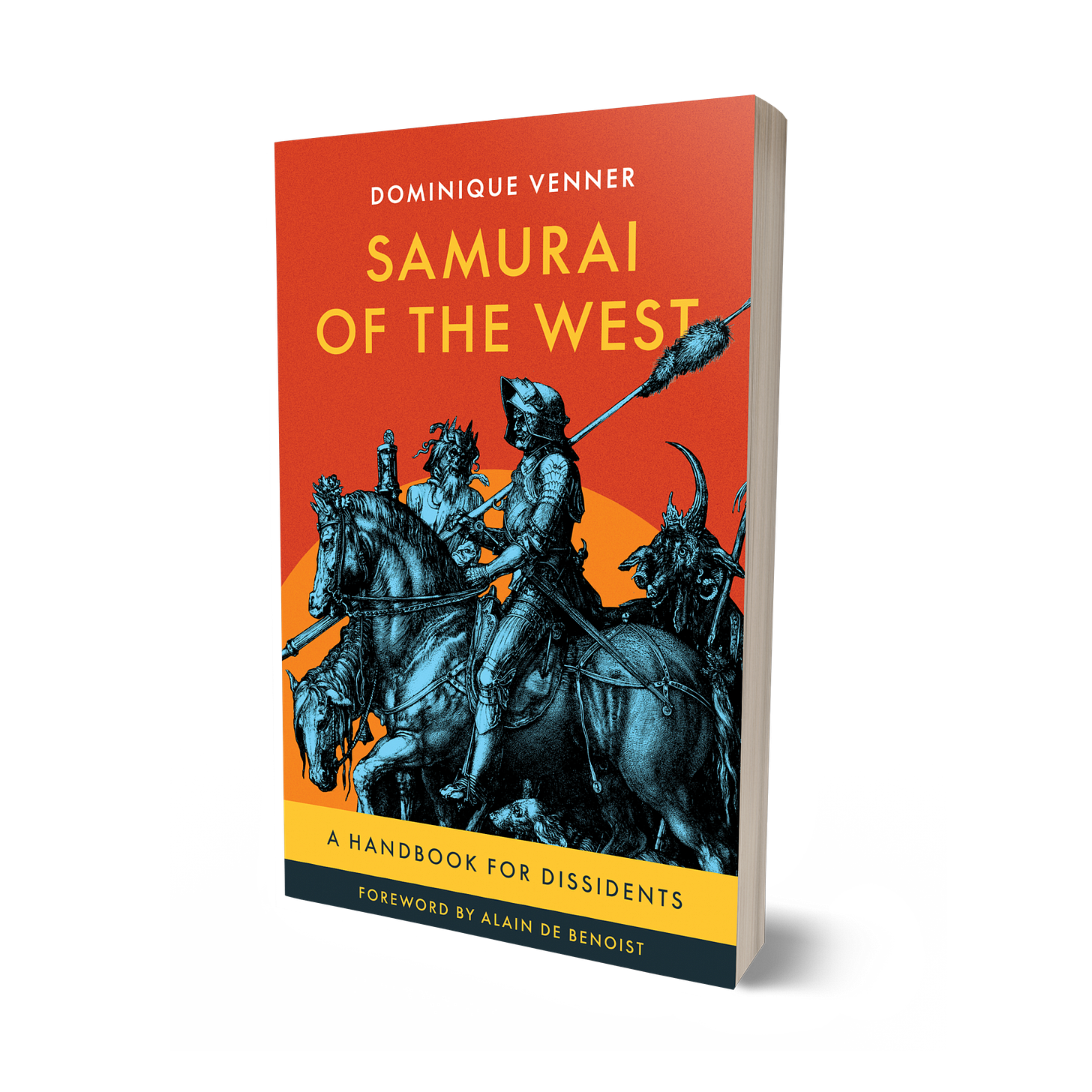OUT NOW: Samurai of the West
by Dominique Venner
“Nature as foundation, excellence as goal, beauty as horizon.”
Samurai of the West is the monumental last testament of Dominique Venner, whose adventurous life and many-faceted works championed the cause of a European renaissance with a style and breadth like no other.
Presented in the unique form of a meditative handbook and breviary, Samurai of the West brings together deep readings of ancient and medieval literature, excursions into forgotten history, and practical advice for upholding one’s bearings in the throes of the modern West. Against the tides of mass immigration, consumerist pseudo-culture, and geopolitical captivity that have debased Europe over the past century, Venner summons today’s Europeans to reignite their spirit by returning to our civilization’s foundational sources and rediscovering the enduring wisdom and ethos of our ancestors.
From the epics of Homer to today’s pressing issues, Venner shows how the existential heights and depths of European thought, art, and action can become a part of our everyday life anew.
“One cannot approach Samurai of the West as one does other books… This “breviary” is neither a little catechism nor a recipe book (even if the author offers some advice “for existing and transmitting”). It is more like a compass. It is also an outstretched hand to lead us to the peaks, where the air is crisper, where forms become clearer, where panoramas reveal themselves and stakes become visible. It is an invitation to become who we are… The historian is now part of history. Read his testament.”
— Alain de Benoist, from the Foreword
From the Prologue:
The meditative historian that I am felt very early on the necessity of transposing into writing his research and reflections on what he saw of his time, and what he felt as decline or awakening. The Breviary that I put forth here develops this in a new form. According to Rabelais’ maxim, it seizes the “substantive marrow.” This is the meaning I give to the word “breviary,” a collection of writings, reflections, and examples to which one can refer each day to nourish one’s thought, acts, and life.
After this prologue, the first chapter will tell the reader where I come from, what it means to be a “samurai of the West,” how I was shaped by the horizon of war as well as built up by historical reflection, the source of memory and the only true antidote to the wanderings of thought.
The following chapter pertains to what I call the “metaphysics of the unlimited,” in which I see the matrix of present and future catastrophes. This “metaphysics” comes from afar. It permeates mentalities and fundamental “representations.” Everything else flows from it: the domination of technology, the spirit of predatory neo-capitalism, unlimited growth, as well as the endangering of nature. Among its consequences, one can count repeated financial crises and foreseeable conflagrations in the future. One cannot think of eventual remedies if one has not identified the causes of the evil, as I propose to do.
For the sake of mental hygiene, I then propose a “detour through Japan.” This highly “modern” yet traditional and refined world is an example of complete otherness in regard to Europe. And yet, we often feel an admiring empathy for the Japan of the samurai. By proposing this “detour” through another world, I suggest another look at our own. To think in a new way, we first need to escape routines.
The fourth chapter is devoted to the ablation of European memory and its reconquest through the “revolution” of tradition. This has nothing to do with those various traditions in the common sense of the word. Nor it is about any backwards-looking view. Tradition is not the past, it is what does not pass. Behind the composite appearances of our tradition, first the Greco-Roman, the Celtic as well, then the Christian, and finally the secular, one will discover the hidden perenniality of our founding tradition, the ultimate recourse for facing the troubles of spirits and comportments.
The fifth chapter proposes a return to the spiritual sources of European civilization through a renewed reading of our founding poems. The goal is to extract the ever-current meaning. Far from a scholastic or university reading of Homer, the one I undertake aims to rediscover a hidden wisdom and living principles: nature as foundation, excellence as goal, beauty as horizon.
Before the epilogue, the final chapter proposes a reflection on what the forgotten wisdom of Stoicism can bring to future Europeans, women and men, children and adults: “What depends on us.” The Stoic school of behavior remained present within European Christianity, of which it was a constitutive part. But we are less interested in ancient Stoicism than in “neo-Stoicism” as a guide for life, education, and comportment for freeing oneself from per- verse and provisionally triumphant deconstructions.
In the appendix, I suggest advice “for existing and transmitting.”
As one will undoubtedly have understood, it is not political solutions that are outlined here, but another vision of the world and of life, drawing from our most authentic sources. It constitutes the foundation on which to build the personal life of each individual, of families, nations, and living communities. But one can also draw therefrom the principles without which any great politics is inconceivable.
— Dominique Venner
Samurai of the West, equipped with a foreword and eulogy by Alain de Benoist, is now available from Arktos:





